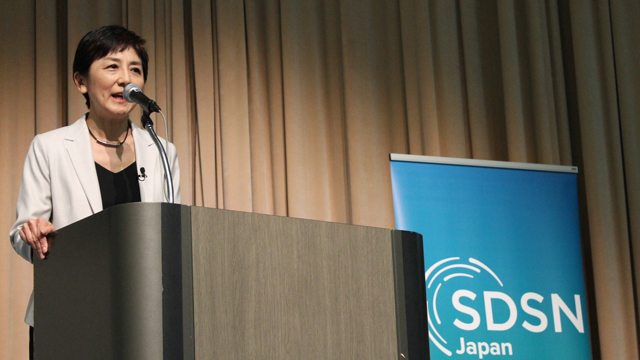2016-04-29

2016年4月16日(土)、公開シンポジウム「持続可能な開発の主流化を目指して:G7サミットプロセスを視野に」が 国連大学にて開催されました。 持続可能な開発ソリューションズネットワーク・ジャパン(SDSN Japan)が主催した本シンポジウムでは、 開会セッションに続き、基調講演、 SDSN Japan理事会メンバーによる座談会、およびパネル・ディスカッションが行われました。
SDSN Japan議長の浜中裕徳氏は、冒頭の主催者挨拶にて、「持続可能な開発のための2030アジェンダ」の実施およびパリ協定の開始に向けて、2016年が重要な年になっていると強調しました。また、 SDSN Japanが G7リーダーに向けて 持続可能な開発目標(SDGs)の実施に関わる政策提言を取りまとめたことが説明されました。シンポジウムに先立ち、提言書は正式に 鬼木誠環境政務官 に手交されました。来賓挨拶において鬼木政務官は先駆的な取組を共有し、官民共同の取組を促進するためのステークホルターズ・ミーティングを開催することにより、SDGsの実施に積極的に取り組んでいくとの方針を明らかにしました。
基調講演を行った武内和彦(国連大学上級副学長、東京大学教授)は、気候変動対策・持続可能な消費と生産・生物多様性・国際開発・教育等の分野で、関係者の具体的な役割に焦点を合わせながら、SDGsの主流化に向けた政策提言について述べました。これは、国谷裕子氏がモデレーターを務めたパネル・ディスカッションにおいてさらに掘り下げられ、 SDGsの実施に向けた具体的な取り組みについて論じられました。
これらの議論のなかで、 単に温暖化対策のみを目的に導入される政策は少なく、他の政策目標にプラスの影響があるものが合意を得られやすいため、SDGs実施を進めていく上では『抱き合わせ』のアプローチが有効であることが説明されました。また、日本においては、将来世代にどのような国を残したいのかを前提に、財政赤字を解消するような温暖化解決に投資し、新しい産業を活性化させていくなど、複合的なアプローチを展開しなくては根本的な解決にはならないとして、「日本国内でSDGsを達成する」というのではわかりづらく伝えづらいため、伝え方を考慮していく必要性が指摘されました。 さらに、企業が収益をあげることによってだけ社会に対する責任を果たしていた時代は終わったとし、投資家が長期にわたる確実なものに投資を行うためにも企業の力を強めることが必要とされ、そうすることで社会も少しずつ変わっていくという考えが示されました。
 「SDGsの主流化に向けたSDSN Japan からの提言」PDF Download
「SDGsの主流化に向けたSDSN Japan からの提言」PDF Download2016-04-18

On 16 April 2016, the Sustainable Development Solutions Network (SDSN) Japan organized a special symposium on “Mainstreaming Sustainable Development: Toward 2016 Summit and beyond” at the UNU headquarters in Tokyo. The symposium consisted of an opening session, keynote speech by Kazuhiko Takeuchi (Professor, The University of Tokyo / Director, Integrated Research System for Sustainability Science), dialogue session by SDSN Japan Council members, and a panel discussion.
The opening remarks delivered by Hironori Hamanaka (SDSN Japan Council Chair / Chair of the Board of Directors, Institute of Global Environmental Strategies) emphasized that 2016 is a key year as the implementation of the 2030 Agenda for Sustainable Development and the Paris Climate Agreement start. In relation to this, Mr Hamanaka pointed out that the 2016 G7 Summit will be a prime opportunity for world leaders to show their commitment and noted that SDSN Japan has developed specific policy recommendations for G7 leaders on SDG implementation. The recommendations were officially handed over to Makoto Oniki (Parliamentary Vice-Minister of the Environment, Japan) prior to the symposium. During his address, Mr Oniki pledged the commitment of the Ministry of the Environment to support the implementation process by organizing stakeholder meetings aimed at sharing good practices and promoting joint efforts between the public and private sectors.
In his keynote speech, Prof Takeuchi outlined SDSN Japan policy recommendations for mainstreaming the SDGs, focusing on the concrete roles that different stakeholders need to play in the areas of climate change, sustainable consumption and production (SCP), biodiversity, international development and education. The topics were further elaborated during a dialogue session with the SDSN Japan Council members and during a panel discussion moderated by Hiroko Kuniya (former hostof NHK programme “Close-up Gendai”), who prompted the panelists on practical actions required for successful SDG implementation.
Among the points raised was an emphasis on the co-benefits approach, whereby legislation created in areas unrelated to climate change impels decision-makers to opt for policies with positive effects on climate change mitigation. The panelists also highlighted the need for policymakers to communicate their intentions behind policies for sustainability to the general public. Research too, needs to engage in this dialogue. In promoting corporate behavioural change, the panelists mentioned the need for new methodologies that would help businesses incorporate new logic into corporate management plans and to persuade investors to address the challenges of sustainability. The times when the sole responsibility of the private sector towards society was profit-generation are over. Businesses need to rethink how to contribute to society in line with the SDGs. The discussion concluded with a call to all stakeholders to embrace the SDGs as a concrete action plan rather than an abstract ideal.
 Policy Recommendations for Mainstreaming SDGs PDF Download
Policy Recommendations for Mainstreaming SDGs PDF Download